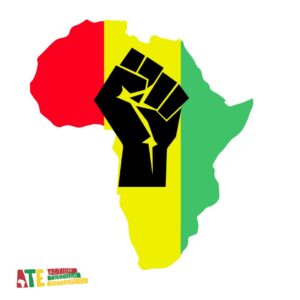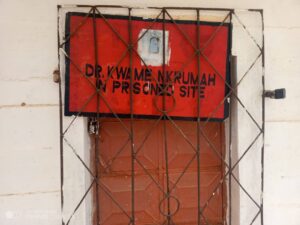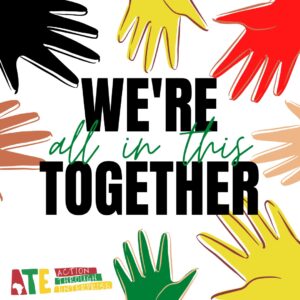 Like many people around the world, we are deeply shocked and outraged by the recent racially motivated events in the United States. The murder of George Floyd (as well as Ahmaud Arbery, Breonna Taylor and too many others), the subsequent state-sanctioned violence against anti-racist protestors, and the inflammatory comments from those in power, all demonstrate just how far there is to go until we achieve racial justice.
Like many people around the world, we are deeply shocked and outraged by the recent racially motivated events in the United States. The murder of George Floyd (as well as Ahmaud Arbery, Breonna Taylor and too many others), the subsequent state-sanctioned violence against anti-racist protestors, and the inflammatory comments from those in power, all demonstrate just how far there is to go until we achieve racial justice.

Whilst we are shocked at the events in the US, we think that it is important to recognise and challenge the UK’s history of oppression too. Reminders of this are unnervingly close to home – looking out the window of our ATE Inclusion Centre in Lawra, you can see the prison cell where Kwame Nkrumah, the powerful independence leader and future first president of Ghana, was kept by British colonial troops during his struggle for his country’s freedom. His 1 metre square prison cell is now situated next to a beacon of inclusivity.
Over recent weeks, we have had important and difficult conversations inspired by the Black Lives Matter movement. We have discussed and reviewed our response at each organisational level: whole team meetings, UK team meetings, and trustee meetings. We have shared and expressed our views, touched on lived experiences, and challenged our approach. We spoke of the heartbreak, the vulnerability and insecurity that is felt while watching these atrocities unfold, and of the barbarism of the abuse. From here we collectively created our position on the issue, and our next steps, to ensure we are holding ourselves and the organisation accountable.
Our next steps – we plan to:
- Reflect – Challenging ourselves as an institution on any matter should usefully begin with some individual self-reflection on our thought patterns and behaviours. We have committed to working through Layla F. Saad’s, ‘Me and White Supremacy’, as a starting point to reflect on our own positions.
- Educate – A crucial part of our next steps is education. We will be reading and educating ourselves on the issue further and asking questions. Furthermore, through sharing this post and the valuable resources within it, we hope to inspire others to look inward. We seek to also educate through role-modelling – through our organisation firmly standing together against racism.
- Review – We are committed to both the diversification of our board and to providing excellent professional development opportunities for our Ghana staff. We pledge to regularly review our policies and guidelines to ensure they are anti-racist and promote true equality.
- Challenge – We will continue to challenge ourselves and others on the issue of racial justice, diversity and equality. We have added the issue as an agenda item on all Trustee and Senior Leadership Meetings and have committed to a twice-yearly review within the organisation, to ensure this remains at the forefront of our minds.
The #BlackLivesMatter movement has brought to light the urgency  for us all to look inwards, to assess our privilege, and to tackle our own complicity in racial injustice, both implicit and explicit. The UK ATE base is embarking on a journey to improve our practice and to educate ourselves on how we can be better allies. We are committed to regularly addressing our organisational and individual racism where it exists, and our complicity in systems which perpetuate inequality. Engaging in this uncomfortable work can lead to a feeling of vulnerability, but it is essential to ensure we are doing our part in this important and emotional global movement. To make the world more equal, and safe for every person, each and every one of us has a responsibility to step into the discomfort. There is great strength in vulnerability, in opening up the difficult feelings of shame and guilt.
for us all to look inwards, to assess our privilege, and to tackle our own complicity in racial injustice, both implicit and explicit. The UK ATE base is embarking on a journey to improve our practice and to educate ourselves on how we can be better allies. We are committed to regularly addressing our organisational and individual racism where it exists, and our complicity in systems which perpetuate inequality. Engaging in this uncomfortable work can lead to a feeling of vulnerability, but it is essential to ensure we are doing our part in this important and emotional global movement. To make the world more equal, and safe for every person, each and every one of us has a responsibility to step into the discomfort. There is great strength in vulnerability, in opening up the difficult feelings of shame and guilt.
We pledge to improve our anti-racism, to model the difficult process of owning our complicity, to doing better.
For some of the resources we found especially helpful, please see:
- Me and White Supremacy– Layla F. Saad
- Why I’m No Longer Talking to White People About Race – Reni Eddo-Lodge
- TED Talks to help you understand racism
- Dr Robin D’Angelo discusses ‘White Fragility’
- TED Talk – The Danger of A Single Story, Chimamanda Ngozi Adichie
- Scaffolded Anti-Racist Resources
Causes to donate to:
- UK Race Charities List
- A list of many incredible organisations in Minneapolis doing powerful work
- Further list of where to donate